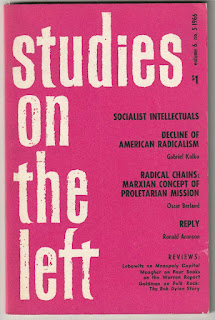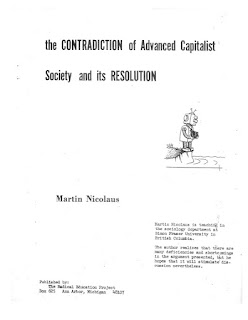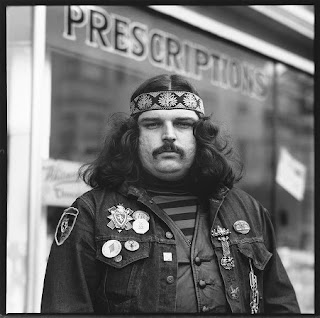The historical dust has not settled, but at this moment it seems clear that a proletariat which does not embrace Marxism is entirely possible. Why not, then, Marxism without a proletariat? In a thoughtful article, "Radical Chains: The Marxian Concept of Proletarian Mission" (Studies on the Left, September-October, 1966), Oscar Berland argues that this is not only a thinkable but also a necessary thought. Ronald Aronson's "Reply" to Berland agrees that the proletariat has lost its revolutionary potential, but forcefully asserts that to scuttle the concept of proletarian mission is to scuttle Marx himself. The present paper in general sustains Berland, but puts the argument in sharper terms. At the same time, and this is its major purpose, this paper attempts to show that Marx's mature
Topics:
Sandwichman considers the following as important:
This could be interesting, too:
Robert Vienneau writes Austrian Capital Theory And Triple-Switching In The Corn-Tractor Model
Mike Norman writes The Accursed Tariffs — NeilW
Mike Norman writes IRS has agreed to share migrants’ tax information with ICE
Mike Norman writes Trump’s “Liberation Day”: Another PR Gag, or Global Reorientation Turning Point? — Simplicius
The historical dust has not settled, but at this moment it seems clear that a proletariat which does not embrace Marxism is entirely possible. Why not, then, Marxism without a proletariat? In a thoughtful article, "Radical Chains: The Marxian Concept of Proletarian Mission" (Studies on the Left, September-October, 1966), Oscar Berland argues that this is not only a thinkable but also a necessary thought. Ronald Aronson's "Reply" to Berland agrees that the proletariat has lost its revolutionary potential, but forcefully asserts that to scuttle the concept of proletarian mission is to scuttle Marx himself. The present paper in general sustains Berland, but puts the argument in sharper terms. At the same time, and this is its major purpose, this paper attempts to show that Marx's mature economic theorizing (the core of which Berland rejects as "droll") was by no means centered around the concept of a "mission," proletarian or otherwise, and that Marx's formulation of the laws of capitalist development—unfortunately, for the proletarian cause—can be shown to have been depressingly accurate and realistic. Bringing to light a much-neglected aspect of Marx's work, this paper hopes to stimulate interest in investigating the usefulness of the surplus-value concept for the understanding of modern capitalist class structure.
Martin Nicolaus's "Proletariat and Middle Class in Marx: Hegelian Choreography and the Capitalist Dialectic" (Studies on the Left, January-February, 1967) not only put Oscar Berland's argument in "sharper terms," it also employed Marx's as yet little known and untranslated manuscripts from 1857-58, the Grundrisse, to do so. I have explored Nicolaus's discussion in that article of the Grundrisse in an earlier post, Seeing the frowns on the jugglers and the clowns, so I won't elaborate on that aspect here.
What I am mainly interested in here is some added speculation in Nicolaus's subsequent "The Contradiction of Advanced Capitalist Society and it Resolution," which condensed and popularized some of the earlier article's broader conclusions. It was originally presented at a seminar at Simon Fraser University in October of 1967 and was subsequently published as a pamphlet by the SDS Radical Education Project. But first there is a key point in Berland's article that is worth reviewing.
Berland traces the "revolutionary mission of the proletariat" to Marx's early essay, the "Introduction to a Contribution to the Critique of Hegel’s Philosophy of Right." (Zur Kritik der Hegelschen Rechtsphilosopie, Einleitung). The essay contained a paragraph that has been imprecisely immortalized as "religion is the opiate of the masses." The full sentiment is somewhat more sympathetic to religion's positive contribution, while losing none of its critical edge:
Religious suffering is, at one and the same time, the expression of real suffering and a protest against real suffering. Religion is the sigh of the oppressed creature, the heart [or "mind"] of a heartless world, and the soul of soulless conditions. It is the opium of the people.
So it is in the context of a continuation of Feuerbach's critique of religion that the proletariat as the subject of revolution first appeared. Furthermore, the proltetariat's revolutionary role was presented in the specific context of the German people's political backwardness (Germany was not yet a unitary state):
Where, then, is the positive possibility of a German emancipation?
Answer: In the formulation of a class with radical chains, a class of civil society which is not a class of civil society, an estate which is the dissolution of all estates, a sphere which has a universal character by its universal suffering and claims no particular right because no particular wrong, but wrong generally, is perpetuated against it. ... This dissolution of society as a particular estate is the proletariat.
Berland described this passage as the young Marx exalting in "the mere swish of his sword through the air," taking the expression from Marx's biographer, Franz Mehring. Nicolaus ignored the Berland/Mehring metaphor and employed his own of "choreography," which after all is not that dissimilar from sword swishing.
Three considerations need to be reiterated about the specific context of Marx's declaration. First, that it is in response to what Marx saw as the politically retarding influence of religion. Second, that it addressed the comparative semi-feudal backwardness of the Germans relative to England and France. And third, that the declaration occured years before Marx had begun his study of political economy. Of course, Marx himself shamelessly generalized from this anomolous particular and even suggested work arounds for when the class with the radical chains declined to rattle them spontaneously, as Harold Rosenberg objected in "The Pathos of the Proletariat."
In his "Contradiction of Advanced Capitalist Society" pamphlet, Nicolaus omitted the textual criticism of early works by Marx, settling for the summary that "Marx never succeeded completely in welding his pamphleteering and his serious political economic analysis into an organic, coherent whole." Nicolas didn't mention the Grundrisse in his pamphlet but it's influence is evident if you know where to look. For example, he quoted the mature Marx, "Capital is its own contradiction," which is a rough translation of a passage from the Grundrisse.What was new and intriguing in "The Contradiction" is Nicolaus's tentative search for an alternative revolutionary subject in advanced capitalist society:
Radical social ideas are radical not because they express the demand for some imagined desirable society, not because they protest against some inequity in the present order. Their radicalness derives from their ability to express the repressed potential of the present social order, from their accuracy in pointing to the possibilities which the status quo negates.
In a subsequent section titled "Workers or Hippies," he expanded on the notion of expressing the repressed potential of the social order.
It is beyond my purpose and my abilities to present an adequate summary of the hippie subculture. However, certain distinguishing features can, I think, be described at this point. First, one must peel away an entire massive layer of commercialism and faddism. Then one must work past the drug issue. In this regard, 'straight' society insists that the use of drugs is an escape from reality, while spokesmen for the hippie subculture insist with equal firmness, though more gently, that the use of drugs is a means of exploring reality more effectively. It may be that neither explanation is valid. My own informal observations lead me to think that the use of drugs serves as little more than an esoteric rite, a badge of identification to demarcate this subculture sharply from the larger culture and to promote internal solidarity, much like the Semitic refusal to eat pork or the secret handclasps of fraternal orders. Once past the drug issue, what remains of the hippie subculture can be summarized under two headings. First, the hippie refuses to work for a living if at all possible (though he may work, typically in artistic forms for pleasure and self-satisfaction). Second, the hippie culture denies the importance of the relationship between men and commodities, and asserts the primacy of direct relationships among human beings. These two principles amount to the assertion, so offensive to capitalist society and those who share its ethos, that there are more important things in life than to earn one's living. Variously subsisting on the surplus income of middle-class parents, on the waste products of the economy, or on handouts from any source available (rarely are hippies able to receive welfare payments), the hippie subculture asserts that the era of material scarcity is or should be over, and declares that the time has come to abolish the compulsion exercised by economic relationships over genuine human relationships. A subculture within the subculture, the 'Diggers,’ has begun to organize an embryonic economic subsystem based on free distribution of necessary goods.
In retrospect, Nicolaus's description of the "hippie culture" needs to be qualified with the stipulation that most young people in the 1960s with long hair, readers of the alternative press, users of marijuana and LSD, and critics of the stereotypical 1950s suburban lifestyle and work ethic were not hippies. The were only designated hippies by the media and by passing yahoos in a car shouting, "get a job, hippie!"
While doing the archival research for this essay, I came across Sweet Chaos, a book about the Grateful Dead by Carol Brightman, who had been the publisher and editor of Viet-Report in the 1960s and helped launch its short-lived successor, Leviathan. Sweet Chaos alternates between a narrative about the Dead, Deadheads, and Jerry Garcia on one hand and reflections on her own political activism during the 1960s. She was trying to come to terms with the endurance of the Greatful Dead phenomenon and the evaporation of the political radicalism of the 1960s.Brightman's answer to her question appears unobtrusively five pages before the end of the book: "The Grateful Dead, the institution, the True Church that sleeps and feeds at once, is a haven in a heartless world..." Was the paraphrase of Marx intentional or unconscious? "The drugs had always gone hand in hand with the music, more for him than the others," Brightman had written of Jerry Garcia four pages earlier:
To get high on the Persian, Garcia's opiate of choice, more like morphine than heroin, he might load up on Percodans, then use Demerol or Dilaudid to straighten out for a show… When Jerry ran over his gram-a-day quota of Persian (a gram cost seven hundred dollars)… and he was too "junk-sick" to perform, he might go onstage full of Valium, bumping into the mike, dozing off in the middle of a dirgelike song, losing whole stanzas, even after a TelePrompTer was installed at his feet. For coworkers like Cameron Sears, what was "shocking" and "ironic" about Garcia's death on August 9, 1995, in the drug rehab facility called Serenity Knolls, was that it occurred when "he was taking all the right steps to rectify the past shit he'd been through." But it was "too little too late."
Garcia left an estate valued at $9.9 million, according to court documents filed in March 1997.



